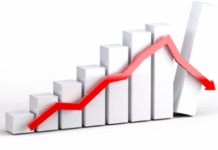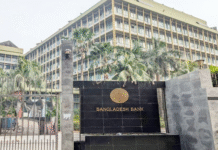 Why the govt is borrowing so much: Analysis
Why the govt is borrowing so much: Analysis
A sort of recession is prevailing in the economy, economists have said.
The revenue income of the government has decreased as the production sector has slowed down.
Revenue collection is less in all sectors including VAT, duty and income tax.
The government is struggling to meet expenses as the income has fallen. It is implementing a number of projects as well as meeting daily expenses. The government is raising the cost of the projects being implemented over the years. Altogether the expenditure is on a steady rise.
Under such circumstances, the banking sector is the only source of loans for the government.
But the banking sector itself is in crisis. On the one hand the government is taking additional loans, and on the other, the private sector is getting limited loans.Moreover, there is no control over the defaulted loans. Under the directives of the government, investment has to be raised in the capital market. The latest crisis is that the banking sector is compelled to fix a 9 per cent interest for bank loans and 6 per cent for deposit. As a whole, the banking sector, hit by bad governance, is struggling to manage itself.
Highest loans in a decade
In the financial year of 2019-20, the government aimed at taking loans of Tk 473.64 billion from the banking sector.
However, the government has already taken loans of Tk 490.09 billion between 1 July 2019 and 21 January 2020.
In the financial year of 2018-19, a total of Tk 308.95 billion was borrowed from the banking sector, according to the research wing of Bangladesh Bank.
As per Bangladesh Bank, the government owed Tk 1080.95 billion to the banking sector in 30 June 2019. Now this has increased to Tk 1572.05 billion. Of the amount, the government owes Tk 443.65 billion to Bangladesh Bank and Tk 1168.40 billion to the scheduled banks.
According to the finance ministry, the government is now taking highest amount of loans from the banking sector in last ten years.
When asked about the matter, finance secretary Abdur Rouf Taluker declined to make comments.
Two major reasons:
In the current financial year, the volume of budget is Tk 5231.90 billion. Of this, the revenue target is Tk 3819.78 billion and the remaining Tk 1453.80 billion is deficit. The government is taking loans from the banking sector to meet the deficit.
In the last ten years, the government is taking additional loans this year as the income has fallen and the expenditure has increased.
The National Board of Revenue (NBR) alone is to collect Tk 3256 billion of the total revenue target. The deficit of NBR’s revenue collection stands at Tk 315.07 billion in six months, that is, between July and December.
NBR has to collect 45 per cent higher than the revenue collected in the last year. However, the reality is that the growth of revenue collection is only 7.39 per cent.
On the other hand, the sale of savings certificate has decreased. Despite higher interest rate, the government collected a good amount of money from this source. But this year, the government is unable to do so.
According to the central bank, savings certificates of Tk 54.41 billion have been sold between July-November. During the corresponding period of the last fiscal year, saving certificates of Tk 216.62 billion were sold.
Why so much loans
According to Bangladesh Bank, imports have decreased by 5.26 per cent in July-November of the current fiscal as compared to that of the corresponding period of the last fiscal. Bangladesh Bank has data of opening LC and settlement of two months (July and August).
In these two months, opening of LC for importing industrial raw materials has decreased by 19 per cent and settlement by 6.52 per cent. The import of capital machineries has decreased by 7.48 per cent and settlement by 12.48 per cent.
According to the Export Promotion Bureau (EPB), exports have decreased by 5.84 per cent in six months (July and December). During the corresponding period last year, the export increased by 2.89 per cent.
The government’s increased borrowing from the banking sector is linked to this negative scenario. Not only is the international trade in a bad shape, but the internal economy is not in a good shape either.
In the last one decade, the government itself is a top investor. In proportion to the GDP, the government’s investment in the financial year of 2009-10was 4.67 per cent.
Now the investment of the government has increased to 8.17 per cent while the private investment increased to 23.04 per cent from 21.56 per cent.
The private investment creates employment. As private investment has not increased in last one decade, employment opportunities have not increased either.
Many analysts termed the progress of the last one decade as growth without employment. As employment has not increased, income has not increased. If we adjust inflation with the wage hike, the net income has hardly increased.
Economy heading towards uncertainty
When the government takes additional loans from the banking sector, the private sector does not get the loans necessary to build industries.
Despite acknowledging this, the government continues to take loans from banks to meet expenses.
However, there is no guarantee that the private sector will take loans if money is available in the banks. There must be an environment for investment. Now the government thinks that the investment will increase if the interest is fixed at 9 per cent. Banks are not lowering interest rates willingly, they are doing this at the directives of the government. There is a doubt as to how far this will be effective.
Alongside fixing interest rates, the additional borrowing from the banks by the government will deteriorate the banking sector further, the economists have said.
Speaking to Prothom Alo, World Bank’s former lead economist Zahid Hossain said there are negative trends in the investment and export. Besides, other indicators of the economy are negative. Only the growth of remittance is good.
He noted that the expatriates are sending money for their relatives as the condition of the economy in the country is in a bad shape.
Different sectors, including agriculture and the production, are not doing well this year. New investment is not coming in.
The employment opportunities will not increase if the investment does not increase.
Analysing the indicators of the last six months of the current fiscal year, a sort of recession is prevailing in the economy.
*This report, originally published in Prothom Alo print edition, has been rewritten in English by Rabiul Islam.









